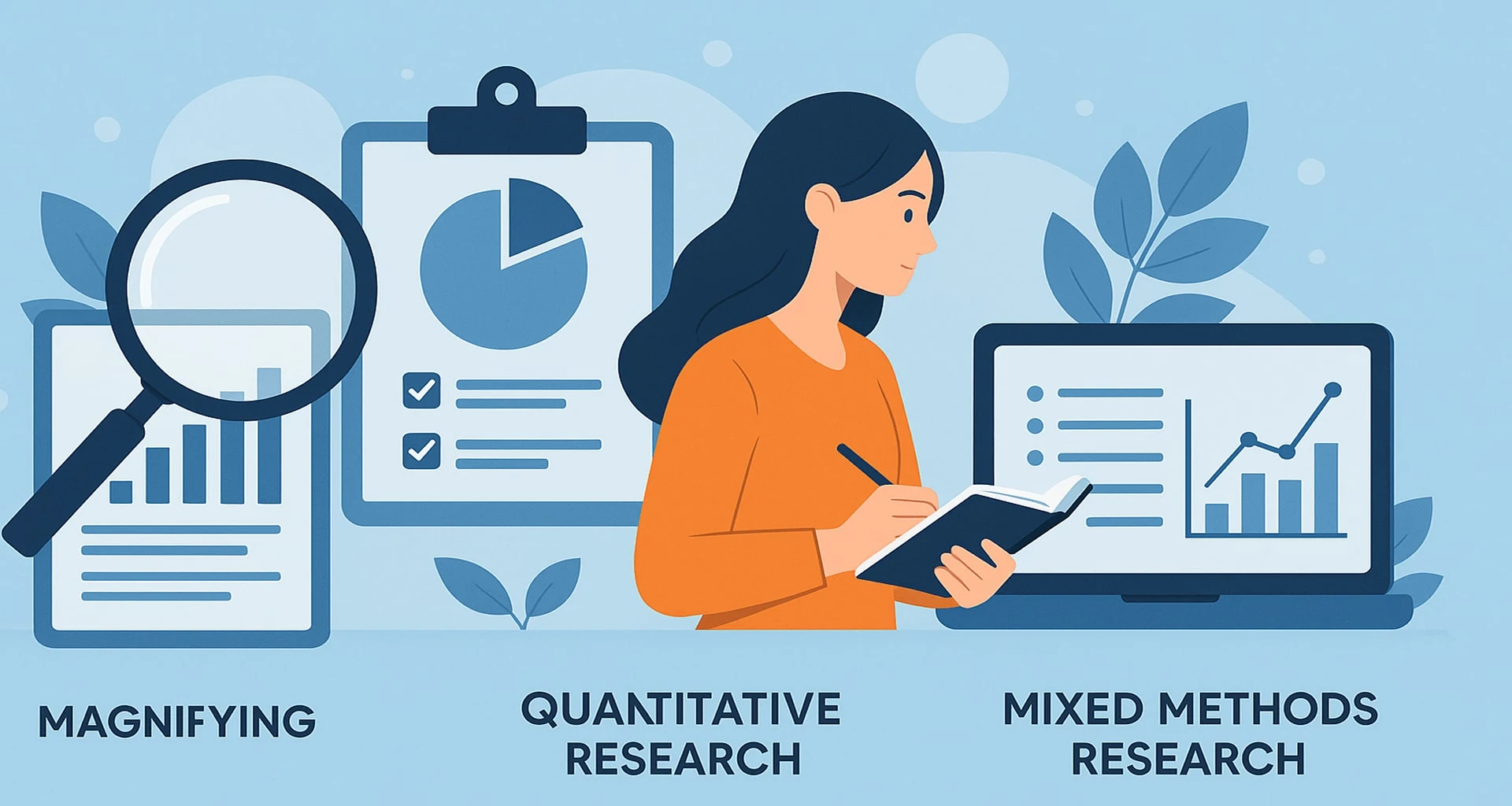7200859259



In academic research, selecting the proper research methodology can notably have an effect on the success of your study. Whether you’re writing your first thesis or conducting doctoral research, grasp the one-of-a-kind kinds of research methodologies and making use of them correctly is crucial. This information breaks down foremost research methodologies and indicates how professional assist can assist you plan a rigorous, impactful study.
Research methodology refers to the strategies, tools, and techniques used to collect and analyze data. It ensures your find out about is systematic, valid, and aligned with educational standards. Your methodology publications the entirety from statistics series to interpretation and justifies why your strategy great matches your research questions.
Most research methodologies fall into three wide categories:
Quantitative Research
Qualitative Research
Mixed-Methods Research
Quantitative research focuses on numerical data, statistics, and generalizability. It’s used to check hypotheses and measure variables throughout giant samples.
.webp)
Descriptive Research: Describes traits of a crew or state of affairs (e.g., surveys on scholar demographics).
Correlational Research:
Examines relationships between variables barring inferring causality.
Experimental Research:
Tests cause-effect relationships thru managed experiments.
Quasi-Experimental Research: Similar to experimental however lacks random assignment.
Survey Research: Uses structured questionnaires to gather statistics at scale.
Causal-Comparative Research: Compares current companies to discover cause-effect relationships (e.g., people who smoke vs. non-smokers).
Define clear, testable hypotheses.
Use energy evaluation to decide pattern size.
Ensure instrument reliability (e.g., Cronbach’s alpha).
Plan your statistical evaluation in advance.
Qualitative research explores complicated human experiences, perceptions, and social contexts. It focuses on rich, descriptive statistics as an alternative than numbers.
Phenomenological Research: Studies lived experiences (e.g., persistent ache patients).
Grounded Theory: Builds theories from the information itself.
Ethnography: Observes and archives cultural practices over time.
Case Study: Offers in-depth perception into unique instances or events.
Narrative Research: Analyzes tales to recognize non-public meaning.
Qualitative Content Analysis: Interprets texts and visuals to perceive themes.
Mixed-methods research combines quantitative and qualitative strategies to achieve a greater complete understanding.
Convergent Parallel: Collect each kinds of facts concurrently and merge results.
Explanatory Sequential: Start with quantitative, accompanied via qualitative to provide an explanation for findings.
Exploratory Sequential: Begin with qualitative, then use findings to construct quantitative instruments.
Embedded Design: Integrate one structure of statistics into the dominant methodology (e.g., qualitative insights in a medical trial).
Clearly provide an explanation for why integration is needed.
Align research questions with each information types.
Plan for more time, budget, and expertise.
Present findings the usage of built-in codecs like joint displays.
Beyond the primary categories, different superior methodologies are beneficial in particular disciplines:
Action Research: Collaborative, real-time problem-solving with practitioners.
Historical Research: Analyzes past information to interpret events.
Meta-Analysis: Synthesizes statistics from a couple of research to examine average trends.
Delphi Technique: Achieves professional consensus thru a couple of survey rounds.
Narrative Inquiry: Focuses on how persons make experience of their experiences.
Case-Control Studies: Compares agencies with and barring a situation to become aware of danger factors.
Longitudinal Research: Tracks members over time to find out about improvement or change.
Choosing the proper research methodology relies upon on quite a few factors:
Research Questions: Quantitative for “how many,” “to what extent”; qualitative for “how” and “why.”
Scope and Resources: Quantitative research want large samples and statistical tools; qualitative research require time for interviews and analysis.
Expertise: Use your strengths or are seeking assist for technical areas (e.g., information or coding).
Ethics: Address consent, confidentiality, and touchy data, and are seeking for ethics approval when necessary.
Pilot Studies: Test equipment and approaches on a small scale earlier than full implementation.
Validity and Rigor: Use splendid requirements for reliability and trustworthiness primarily based on methodology.
Study current research to pick out gaps.
Keep them clear, focused, and aligned with your methods.
Design surveys, interview guides, or statement protocols.
Use fantastic sampling techniques (random for quantitative, purposive for qualitative).
Statistical tests, software program like SPSS or R.
Thematic analysis, coding with NVivo or guide techniques.
Use consent varieties and impervious approval from ethics boards.
Identify and restore troubles in contraptions or procedures.
Organize securely and keep constant formats.
Link evaluation returned to research questions.
Acknowledge what your find out about can't cowl and advise future directions.
.webp)
Vague Questions: Leads to uncertain findings refine early.
Too Broad a Scope: Focus on manageable goals.
Skipping Ethics Approval: Can invalidate your study.
Inadequate Sample: Impacts reliability use appropriate sampling.
Lack of Analysis Plan: Wastes effort plan ahead.
Poor Documentation: Makes replication or comparison difficult keep records.
Bias in Interpretation: Use tests like peer opinions and reflexivity.
Cultural Insensitivity: Customize techniques to nearby contexts.
Weak Integration in Mixed-Methods: Combine statistics meaningfully.
There’s no one-size-fits-all research methodology. Your desire need to be guided through your research questions, goals, expertise, and reachable resources. By gaining knowledge of the distinctions between quantitative, qualitative, mixed, and area of interest methodologies, you can graph a strong, valid, and impactful study.
Need professional assist with your research methodology?
Our tutorial consultants can assist you:
Refine your research questions
Choose the right methodology
Develop facts series tools
Plan rigorous facts analysis
Strengthen the credibility of your research
Start your research journey nowadays with professional practise that ensures tutorial success.